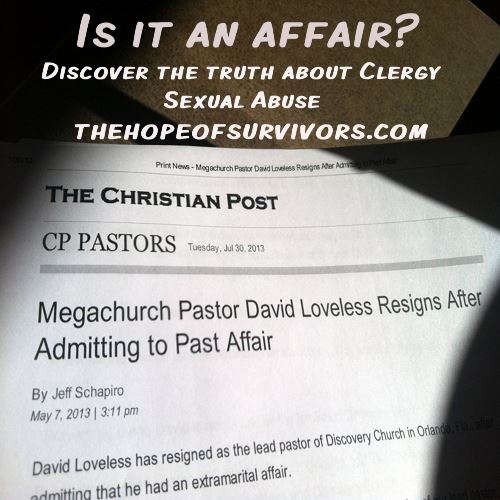Pastoral Affair or Abuse of Power?
Title Expectations
Titles and degrees are given to various professions because they earned that document and prefix to their name through education and training. As a result, we develop predetermined ideas about their role and the responsibilities they are expected to uphold. For example, we depend on doctors to care for our physical needs because their title causes us to believe they have been educated and trained to do so. Ethically and morally, we expect doctors to make decisions that are in our best interest and health. When we send our children to school or attend ourselves, we expect educators to teach and give information that will benefit us intellectually. Their role is to care for and help the students reach their educational goals. There is a level of trust placed on professionals that arises simply from their name. In the same sense, and probably even more so, we inherently trust spiritual leaders because their title tells us they are representatives of God; we automatically believe they are educated, trained, and care about our spiritual lives. We trust them with confidential information, often sharing personal issues, because their role tells us we can. By character, a pastor is to be a humble servant leader, working to help his congregation reach their spiritual goals. Sadly, in recent days, too many self-appointed, self-seeking, and self-satisfying church leaders are masquerading as pastors.
Wolves in Sheep's Clothing
More and more news stories are reporting a resounding similarity: Pastor resigns after a 'moral failure,' 'sexual misconduct,' or 'affair.' The problem, they say, is that men are frail, weak, and merely human. That is a gross distortion of the truth of what is happening in the church today. The problem is not with the frailty of man; the problem is with wolves in sheep's clothing filling the pulpits and the church not recognizing their presence. It is vital to understand where the problem lies so these wolves are removed from their trusted positions of leadership. We can no longer use words like 'moral failure' or 'affair' when referring to a pastor having a relationship with a member under his care. The very role of a pastor is to care for his flock. When he chooses to use a sheep for his satisfaction, he has betrayed the sacred trust inherent in his title. Titles and degrees are given to assure us that the person we are seeking help will do what they promised. When that promise is broken, it becomes a breach of trust and an abuse of power. Pastors are not having affairs with members of their flock. That is a misconception that must be recognized and resolved by the church.

Misconception of Mutual Consent
When we hear about a pastor having an affair with a member of his congregation, it automatically implies mutual consent and we place the blame on the leader as well as the woman who was under his care. This is the most difficult misconception to recognize because adults are involved. The church must realize the power imbalance between clergy and congregants. A pastor has more knowledge, more responsibility, more information, and more authority than a member of his church. The inherent trust placed upon church leaders allows them to become privy to personal and confidential information. The pastor has access to his members' weaknesses, vulnerabilities, and marital problems. What he does with that information is extremely important to understand, keeping in mind the role of a Shepherd is to lead, guide, teach, and care for his flock. Imagine the following scenario. A woman goes to her pastor for spiritual help and counsel, trusting him because that is what his title and role tell her. She is wounded and vulnerable. She has no recognition of a wolf in sheep's clothing because her pastor's responsibility and promise are to help her. She cannot comprehend that he would use her, that he would seek his own satisfaction over her protection. These possibilities never cross her mind. He is her pastor, a representative of Jesus. If he chooses to betray his commitment to protect her and instead uses her for his satisfaction, it becomes abuse due to the power imbalance. He has more information than she has. He has more knowledge than she has. He has more authority than she has. He has more responsibility than she has. This clear imbalance of power reveals there can never be consent when an adult enters into a relationship with a pastor.
Christian Counseling Code of Ethics
- American Association of Christian Counselors » Code of Ethics
"Due to the inherent power imbalance of helping relationships, as well as biblical principles related to sexual behavior outside of marriage, such apparent consent is considered illusory and illegitimate." (Sec. 1-130)
Misconception of the Frailty of Man
In articles about pastoral affairs, it is almost justified by stating, "he's only human" or "due to the frailty of man." While pastors are human and sin, a major distinction here is that he should not lead someone under his care to sin with him. Many say, "we all sin" and compare a pastor's sexual sin to ones such as lying, gossip, or anger. In all these comparisons, they are not encouraging another person to sin. In God's eyes, our sin is the same and we need Jesus to be forgiven. However, when a pastor sins by having a sexual relationship with a member of his congregation, the consequences are greater than anger, gossip, or lying because he is leading and encouraging a member of his flock to follow him. No other sin can be categorized with the sin a pastor commits when he engages in an extramarital affair. The frailty of man cannot justify the horrific nature of this form of abuse. Mentioned earlier, the trust level a church leader has simply because of his title along with the vulnerability of those seeking counsel make this issue much more complicated than an affair between people of equal power. Therefore, when a pastor enters a sexual relationship with a member of his congregation, it is not an affair; it is an abuse of power.

Hope and Healing for Victims
- The Hope of Survivors - The truth about sexual abuse by clergy!
The Hope of Survivors provides education, support, hope and healing to those who have been abused by someone in the role of spiritual authority.
Conclusion: Abuse of Power
The church is falling apart from the inside out because too many of its leaders are self-appointed, self-seeking wolves in sheep's clothing, using their flock for their own satisfaction. By reporting 'affairs' among clergy and congregants and not recognizing the betrayal and abuse of power, there is little to no recourse for pastors who choose to abuse their sacred trusted position. Discounting their sinful actions as the frailty of man will cause the church to offer quick forgiveness and allow the abuser back in a position to abuse again. It is not uncommon for a pastor to have been involved in several relationships, either simultaneously or over time, revealing a lack of accountability and recourse. Until the church acknowledges there cannot be mutual consent due to the power imbalance and stops justifying a pastor's abuse as mere human weakness, the church will continue to allow its flock to be deeply betrayed and abused by its leaders. The church must recognize that a relationship between a pastor and a member of his congregation is not an affair; it is an abuse of power. Only then will the church begin to thrive and become the safe, secure place God designed and desires it to be.
****While men are used for this writing, women church leaders abuse their authority,deeply betray their sacred trust, and cause much damage to God's Kingdom****








